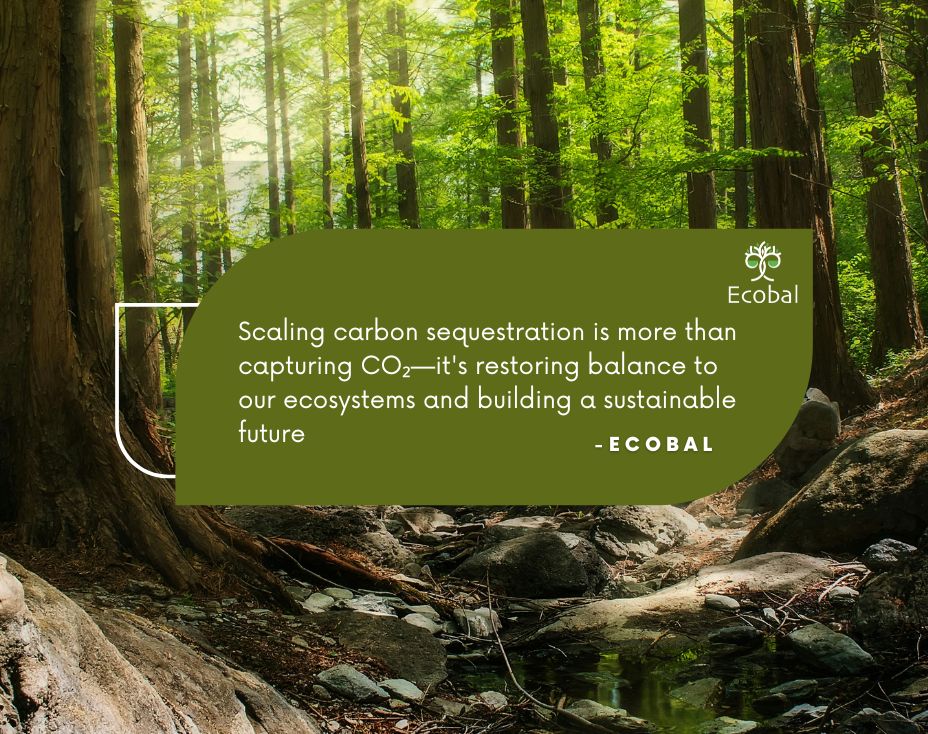How Ecobal is Scaling Carbon Sequestration Across Europe
Ecobal is a pioneering company dedicated to creating a future where ecological balance is the foundation of carbon sequestration efforts, with a significant impact on Europe. By merging advanced digital platforms with natural climate solutions, Ecobal addresses the urgent need to reduce atmospheric CO₂ levels and combat climate change. Since our inception, Ecobal has reached several key milestones, establishing Nature Spots across five EU countries: France, Italy, Poland, Spain, and Romania. Ecobal manages 155 hectares of Nature Spots throughout the EU, which store 1,581 tons of CO₂ and release approximately 1,150 tons of oxygen annually .
Through strategic partnerships, innovative technology, and a commitment to ecosystem restoration, Ecobal is scaling its carbon sequestration efforts to deliver both environmental and economic benefits across diverse European landscapes.

Scaling Carbon Sequestration Across Europe: Key Techniques
1. Leveraging Nature-Based Solutions
At the heart of Ecobal’s approach is a commitment to nature-based solutions (NBS) for carbon sequestration. NBS refers to the sustainable management and restoration of ecosystems such as forests, wetlands, and grasslands to naturally sequester CO2. Ecobal recognizes the potential of these ecosystems to absorb CO2 while supporting biodiversity, water regulation, and soil fertility. By implementing projects focused on reforestation, afforestation, and land restoration, Ecobal not only sequesters CO2, but also promotes the health of natural landscapes and the conservation of biodiversity.
For example, Ecobal works with local communities and conservation organizations to plant native trees in degraded areas. These projects involve planting tree species that are well adapted to the local climate and have high CO2 sequestration capacity. By prioritizing biodiversity and promoting the use of native species, Ecobal’s approach ensures that restored areas provide long-term carbon sequestration and resilience to climate change.
2. Partnerships with European Institutions and Local Communities
Ecobal’s scaling efforts are strengthened by strategic partnerships with government bodies, local authorities, and environmental organizations across Europe. These collaborations allow Ecobal to access diverse landscapes and secure essential resources for large-scale carbon sequestration projects. For example, by applying for project grants from the European Commission’s LIFE-2024 programme, Ecobal is trying to receive funding and technical support, enabling expansion into countries with unique ecosystems.
In addition, Ecobal works closely with local communities and universities to provide training programmes that empower community members to actively participate in ecosystem restoration. This involvement promotes local stewardship and ensures that restored landscapes are maintained and protected for long-term carbon sequestration. By aligning its projects with the socio-economic needs of communities, Ecobal fosters a sense of ownership and promotes sustainable livelihoods in areas where environmental degradation has affected economic stability.
3. Scaling Through Technology and Data-Driven Monitoring
Ecobal’s use of cutting-edge technology for data collection, monitoring, and analysis is critical to its ability to scale effectively. Using satellite imagery, remote sensors, and AI-driven analytics, Ecobal tracks carbon sequestration rates and ecosystem health across its project sites. This data-driven approach allows Ecobal to quickly adapt to environmental changes, optimize resource allocation, and ensure that each project delivers maximum CO2 sequestration.
Furthermore, Ecobal’s monitoring system provides stakeholders with detailed insights into the environmental impact of each project, from soil carbon levels to biodiversity indices. This data not only promotes transparency but also informs future project planning, allowing Ecobal to refine its strategies and maximize the effectiveness of its carbon sequestration efforts.
4. Integrating Blockchain for Transparency and Accountability
To address the challenges of transparency and traceability in carbon offset projects, Ecobal uses blockchain technology. Blockchain provides an immutable, decentralized ledger where each stage of a carbon sequestration project can be recorded and verified. Through blockchain, Ecobal provides stakeholders with real-time data on CO2 sequestration levels, project progress, and resource allocation.
This transparency ensures that organizations, investors and regulators have access to verifiable information, enhancing the credibility of Ecobal’s carbon credits. Each tonne of CO2 sequestered is tokenized, creating a digital asset representing the offset achieved. This system not only increases accountability but also facilitates the trading of carbon credits, making it easier for companies across Europe to invest in carbon offsets.
5. Facilitating Carbon Credits and Promoting Market Accessibility
Ecobal is playing a pivotal role in Europe’s carbon credit market by making carbon offsets more accessible and cost-effective. The company’s blockchain-based tokenization of sequestered CO2 enables the creation of verified, tradable carbon credits. This approach simplifies the process of purchasing carbon credits for companies and individuals looking to offset their emissions, thereby expanding the market for carbon sequestration investments.
Ecobal’s streamlined approach to carbon credits also helps smaller companies and local organizations participate in carbon offsetting, creating a more inclusive and effective market. By enabling a wide range of stakeholders to invest in carbon credits, Ecobal is driving demand for carbon sequestration, which in turn is driving the expansion of its projects across Europe.
6. Addressing Climate Change on a Continental Scale
Ecobal’s efforts are having a measurable impact on carbon sequestration in Europe. With projects spanning multiple countries and ecosystems, Ecobal is making a significant contribution to Europe’s goal of achieving net zero emissions. By scaling up carbon sequestration, Ecobal supports Europe’s commitment to the Paris Agreement and aligns with the European Union’s Green Deal objectives.
Through its holistic approach – using technology, community partnerships, and a focus on natural climate solutions – Ecobal is scaling its impact efficiently and sustainably. As Europe grapples with the urgent need to reduce emissions and restore ecosystems, Ecobal is emerging as a key player, setting a high standard for carbon sequestration initiatives across the continent.
In conclusion, Ecobal’s approach to carbon sequestration is a model of innovation and collaboration. By combining nature-based solutions with blockchain technology, fostering partnerships with institutions and communities, and facilitating a transparent carbon credit market, Ecobal is advancing Europe’s environmental goals. As it continues to expand its projects across Europe, Ecobal is capturing CO2 and creating a legacy of restored ecosystems, biodiversity conservation, sustainable livelihoods, and a strengthened market for carbon sequestration. With its scalable, data-driven solutions, Ecobal is well-positioned to make a lasting contribution to climate change mitigation across Europe.
Why It Matters for Ecobal
Ecobal’s mission to scale carbon sequestration across Europe is deeply aligned with addressing critical environmental challenges like climate change, biodiversity loss, and ecosystem degradation. By establishing Nature Spots across diverse European landscapes, we are actively reducing atmospheric CO₂ levels and revitalizing ecosystems. Each restored habitat not only captures carbon but also fosters biodiversity, supports local communities, and promotes sustainable land management practices. Our approach of integrating nature-based solutions, advanced technology, and community partnerships ensures that we are not only sequestering carbon but building resilient ecosystems that can adapt to future climate conditions.
About the Author: This article is written by Dr. Amisalu Milkias, Ecobal’s CO2 Project Specialist. With a Ph.D. in Restoration Ecology, Dr. Amisalu leads our efforts in carbon sequestration and environmental restoration. His expertise is helping to drive Ecobal’s mission to restore ecosystems and promote sustainability.


